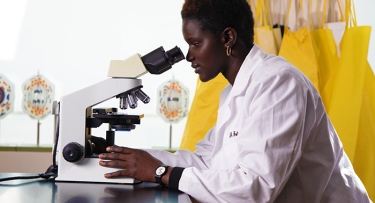Mercy College Clinical Lab Science Graduates' Success Story

Last June, the National Accrediting Agency for Clinical Laboratory Sciences (NAACLS) awarded full accreditation to Mercy College, making it the first Clinical Laboratory Science (CLS) program in Westchester County to achieve this important distinction. But the real triumph is how graduates of the Mercy program are filling a vital role in the care of thousands of patients.
“The CLS program at Mercy College is a hidden gem. It’s the only one of its kind in this region—a fully accredited program that trains students to fulfill an important role in the health care team,” said Dr. Joan Toglia, Dean of the School of Health and Natural Sciences. “Our graduates are meeting a growing need for a service that helps those teams save lives.”
“Many students don’t immediately think of the CLS major as a pipeline to a rewarding career, but it truly is,” mentioned Michelle Naylor, Clinical Laboratory Science Program Director and Assistant Professor. “The significant shortage of CLS professionals has created a strong job market and our graduates are in high demand. Most have job offers at competitive salaries before graduation.”
In the U.S., billions of medical laboratory tests are performed each year, providing a range of diagnostic, technical, therapeutic and support services that directly affect patient care. Many CLS professionals work in hospital settings, performing bloodwork and other tests that are routinely requested by medical staff. With nearly 70 percent of all medical decisions being based on those laboratory results, the job requires a high level of accuracy and skill—and not just in hospitals. CLS professionals are also in demand at pharmaceutical and biotechnology companies, veterinary clinics, academic and industrial research labs and more.
Rachael Bozeman ’18 knows something about that high demand. Shortly after graduating from Mercy with her CLS degree, Bozeman landed a job at NewYork Presbyterian-Columbia University Medical Center, a large and prestigious teaching hospital in New York City. “Our team runs the diagnostics for the blood bank and transfusion lab,” she explained. “We make sure health care teams are transfusing compatible blood products to their patients by screening the patients’ blood for abnormal antibodies that can cause serious and potentially deadly reactions.”
Though many new graduates start working right away, many clinical laboratory scientists decide to apply to graduate programs in medicine, nursing and dentistry. “The CLS degree makes them great candidates,” Naylor noted. “We get calls from hospitals asking when the next cohort of students will graduate. The need for well-trained technologists is so great, our graduates can pick and choose the locations and even the shifts they want, at an excellent salary."
At Mercy, all didactic courses are taught by Naylor and her colleague, Linda Sherman-Atkins, Assistant Professor of clinical laboratory science. Both have worked or taught in the field for over 20 years, and their passion comes across.
“We try to impress on the students how important it is to be meticulous in their calibrations, because lives are on the line,” Sherman-Atkins said. “You want the patient’s care team to make those critical decisions with confidence.”
Fourth-year students perform clinical rotations at one of Mercy’s hospital affiliates, and often move into jobs in those same hospitals. These currently number more than a dozen, including Westchester Medical Center, Montefiore Hospital, NewYork Presbyterian-Columbia University Medical Center and Northwell Health System. “We are constantly looking for more clinical sites as our program grows,” Naylor mentioned.
What Bozeman said she appreciated most as a student in the Mercy CLS program was the almost round-the-clock access to faculty members Naylor and Sherman-Atkins, who were always available to answer their questions or concerns, no matter how insignificant. “Plus,” she added, “they listen to students, and take suggestions. If something’s not working, or if you have an idea of how to do something more efficiently, they’ll consider implementing it. To me, the whole program felt collaborative. And now it’s grown into something amazing.”
